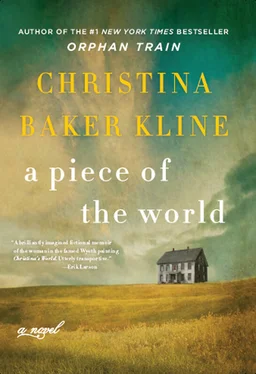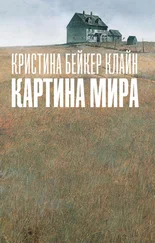I can’t help smiling at her forthrightness. “How did you know that?”
“They told me there’s only one woman living in this house, and she’s named Christina, so I figured.”
Lolly, who’s been winding around my feet, leaps into my lap. The girl strokes her under the chin until she purrs, then glances at the other cats milling around the kitchen. It’s time for their breakfast. “You sure have a lot of cats.”
“I do.”
“Cats only like you because you feed them.”
“That’s not true.” Lolly sinks down, exposing her belly to be rubbed. “I’m guessing you don’t have a cat.”
“No.”
“A dog?”
She nods. “His name is Freckles.”
“Mine is Topsy.”
“Where is he?”
“Probably out in the field with my brother Al. He doesn’t like cats much.”
“The dog, or your brother?”
I laugh. “Both, I guess.”
“Well, that’s no surprise. Boys don’t like cats.”
“Some do.”
“Not many.”
“You seem awfully sure of your opinions,” I tell her.
“Well, I think about things a lot,” she says. “I hope you won’t mind my asking: What’s wrong with you?”
I have spent my life bristling at this question. But the girl seems so frankly curious that I feel compelled to answer. “The doctors don’t know.”
“When I was born, my bones were kind of deformed,” she says. “I had to do all kinds of exercises to get better. I’m still a little crooked, see? Kids made fun of me.” She shrugs. “You know.”
I shrug back. I know.
The girl raises her chin at the pile on the sideboard. “Look at that pile of dirty dishes. You could use some help.” She goes over to the sideboard, makes a pile of dishes, and carries them over to the long cast-iron sink in the pantry.
And then, to my surprise, she washes them.
WHEN PAPA DIES at the age of seventy-two in 1935, he has been so unwell and so unhappy for so long that his death comes as a relief. For decades I did my best to care for this man who ended my schooling at twelve, who squandered the family fortune, such that it was, on a crackpot scheme, who expected his only daughter—possessed of an infirmity as debilitating as his own—to manage the household, and never once said thank you. I fed him, cleaned up after him, washed his soiled clothes, inhaled his sour breath; and his own discomfort was all he could see.
I have to remind myself that once I saw this man as kind and just and strong.
When my brothers and their wives arrive at the house, we go through the familiar motions of mourning, serving cake and tea and slicing ham, accepting condolences, singing hymns. The body in the Shell Room, the burial in the family plot. As I stand at Papa’s grave I think of how he was at the end, miserable in his wheelchair in the front parlor, clutching a chunk of anthracite in his fist and gazing out through the window toward the sea. I don’t know what he was longing for, but I can guess. His robust youth. His ability to stand and walk. His family of origin in the land of his birth, to which he never returned. A clear sense of where he belonged, and to whom, and why. Did he regret the calculations and miscalculations he made that opened up the world to him and eventually narrowed it to this point of land?
Though I lived with this man for my entire life, I never really knew him. He was like a frozen bay himself, I think—an icy crust, layers deep, above roiling water.
AFTER ALL THE mourners leave, I am struck by the vast emptiness of this house, stretching up three floors to the dormers. All these unused rooms. Sam and Fred have started their own family farms and gone into business together, manufacturing lumber and hay. Now it’s just Al and me—and the wheelchair, taking up space in the middle of the Shell Room.
“It’s yours if you want it,” Al says. “Still in pretty good shape.”
I look at the nasty contraption, with its sagging stained seat and rusted wheels. “I hate that chair. I never want to see it again.”
His eyes widen. I guess it’s the first time I’ve said that aloud. He stands there for a moment, sucking on his pipe. Then he goes over to the woodstove, knocks the ashes out of his pipe, and says, “All right. Let’s get rid of it, then.”
I watch as Al drags the wheelchair out the front door and down the steps, where it teeters to its side and crashes over. He disappears into the barn and comes back a few minutes later with Tessie hitched to the small wagon. Pulling on her harness, he leads her close to the wheelchair and heaves it into the wagon, then doffs his hat to me with a smile and leads the horse and wagon down to the cove.
About half an hour later I see Al through the window, trudging back up the field with Tessie. The wagon is empty.
“What’d you do with it?” I ask when he comes through the kitchen door.
He sits in his chair, takes off his cap, sets it on the bench in front of him. Fiddles inside his jacket, pulls out his old brown pipe and a pouch of tobacco. Finds a matchbook in his trouser pocket. Takes a pinch of tobacco, packs it into the pipe, tamps it down with his finger. Adds more tobacco, tamps it down again. Sticks it in his mouth and lights it, cupping a hand around it to protect the flame. Shakes out the match. Sits there inhaling the smoke and blowing it out.
I know better than to rush him. Anyway, we have all the time in the world.
“You know the boulder by the Mystery Tunnel? That drop-off below?” he says after a while.
I nod.
He sucks on the pipe. Takes it out of his mouth and blows a stream of smoke. “I rolled that wheelchair up to the top of the rock and dumped it over.”
“Gone,” I say. “Good riddance.”
“Good riddance,” he says.
For the rest of my life I will think of that wheelchair lying smashed and rusting in the salty water near Mystery Tunnel, a place that once opened me to a world of magic, of possibility, but that over the years has come to mean something else. A place where Walton spun his false promises. A path strewn with anticipation that ends at a pile of rocks. A repository for my broken dreams, the treasure vanishing as soon as I reach for it.
The wheelchair, fool’s gold, in the depths below.
SADIE IS STANDING in my kitchen, dropping off a chicken dish, when she says, “Are the rumors true? I hear Al’s got his eye on that new teacher at the Wing School.”
My skin prickles. “What are you talking about?”
“Angie Treworgy, I think her name is. She’s boarding with Gertrude Gibbons.”
Boarding with . . . Gertrude Gibbons? “I haven’t heard a thing about it.”
“He would make some lucky girl a wonderful husband, don’t you think?”
“No, I do not think,” I say stiffly.
Al has started going out three or four nights a week, usually to join the card game at Fales. He knows I don’t like being left alone at night, but still he goes. On Saturdays he often drives to Thomaston, where the stores and bars stay open until nine. Or at least that’s what he tells me. Now I wonder if he’s going instead to Gertrude Gibbons’s.
I don’t mention what I’ve heard about the teacher, but for several days I give Al the silent treatment. He doesn’t ask why.
I hear no further news of any woman until a few weeks later, when Al mentions casually that he’s going to help out a man who lives with his daughter down near Hathorn Point. “They could use some firewood,” he says. “I told him I’d cut some logs for them later in the week.”
“How old’s the daughter?” I ask.
“What?”
“You heard me.”
“Why do you want to know?”
“I just wonder.”
He gives me a look and scratches his head. “Old enough that it’s rude to ask her age.”
Читать дальше
Конец ознакомительного отрывка
Купить книгу












